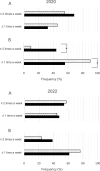Knowledge and attitudes of German and Swiss community pharmacists towards biologicals and biosimilars - a prospective survey before and after the COVID-19 pandemic
- PMID: 38110932
- PMCID: PMC10726545
- DOI: 10.1186/s12913-023-10475-x
Knowledge and attitudes of German and Swiss community pharmacists towards biologicals and biosimilars - a prospective survey before and after the COVID-19 pandemic
Abstract
Background: Knowledge, attitudes and substitution laws of biosimilars are not consistent across countries. Biosimilar acceptance among patients and healthcare professionals may be suffering from gaps in knowledge and understanding about biosimilars and their regulatory approval process. Pharmacists' roles and responsibilities changed considerably during the COVID-19 pandemic. Thus, they might have gained new skills and self-confidence in counseling and substitution of biosimilars.
Aims: To examine and compare the knowledge, perceptions and information needs of German and Swiss pharmacists regarding original biologicals and biosimilars in 2020 and 2022.
Methods: We conducted an online survey among Swiss and German community pharmacies in February 2020 (before) and August 2022 (after the COVID-19 pandemic). Descriptive statistics were calculated and the Chi-Square test was used for comparisons among categorical variables.
Results: A total of 764 pharmacists took part in the survey (390 in 2020 and 374 in 2022) with comparable demographics. The frequency of dispensing biologicals remained similar between German and Swiss pharmacists in 2020 and 2022, but the Swiss dispensation of biosimilars increased significantly in 2022 compared to 2020. Concerning the understanding of the term biosimilars, knowledge remained moderate in both countries in both years. Participants were equally familiar with the term and most felt sufficiently informed. In both countries, substitution with a biosimilar showed the least confidence of all attitudes. A third of the participants indicated correct substitution rules in their country. In both years, around 85% of the participants were highly interested in additional training on this topic.
Discussion/conclusion: The results indicate that similarities and differences between Germany and Switzerland regarding knowledge and attitudes towards biologicals and biosimilars remained unchanged before and after the COVID-19 pandemic. An influence of the pandemic is unlikely. There is still a clear lack of knowledge among community pharmacists on biosimilars, especially regarding the substitution rules. Due to a rising market with many benefits but also big challenges to overcome, the topic of biosimilars should receive more attention in the future. This requires additional training for pharmacists.
Keywords: Attitudes; Biological; Biosimilars; Community pharmacy; Covid-19 pandemic; Knowledge; Survey.
© 2023. The Author(s).
Conflict of interest statement
The authors declare no competing interests.
Figures



Similar articles
-
Knowledge and perception of biosimilars in ambulatory care: a survey among Belgian community pharmacists and physicians.J Pharm Policy Pract. 2021 Jun 22;14(1):53. doi: 10.1186/s40545-021-00330-x. J Pharm Policy Pract. 2021. PMID: 34158128 Free PMC article.
-
European Stakeholder Learnings Regarding Biosimilars: Part I-Improving Biosimilar Understanding and Adoption.BioDrugs. 2020 Dec;34(6):783-796. doi: 10.1007/s40259-020-00452-9. BioDrugs. 2020. PMID: 33141421 Free PMC article. Review.
-
Pharmacists' Perspectives of Biosimilars: A Systematic Review.BioDrugs. 2022 Jul;36(4):489-508. doi: 10.1007/s40259-022-00541-x. Epub 2022 Jul 1. BioDrugs. 2022. PMID: 35776294
-
A survey of pharmacists' knowledge and views of biosimilars in Quebec and France.Ann Pharm Fr. 2017 Jul;75(4):267-275. doi: 10.1016/j.pharma.2017.01.003. Epub 2017 Feb 23. Ann Pharm Fr. 2017. PMID: 28237527
-
Assessing awareness and attitudes of healthcare professionals on the use of biosimilar medicines: A survey of physicians and pharmacists in Ireland.Regul Toxicol Pharmacol. 2017 Aug;88:252-261. doi: 10.1016/j.yrtph.2017.06.013. Epub 2017 Jun 27. Regul Toxicol Pharmacol. 2017. PMID: 28666961
Cited by
-
Biosimilars Targeting Pathogens: A Comprehensive Review of Their Role in Bacterial, Fungal, Parasitic, and Viral Infections.Pharmaceutics. 2025 Apr 28;17(5):581. doi: 10.3390/pharmaceutics17050581. Pharmaceutics. 2025. PMID: 40430873 Free PMC article. Review.
References
-
- European Medicine Agency (EMA). Biosimilars in the EU - information guide for healthcare professionals 2019; https://www.ema.europa.eu/en/documents/leaflet/biosimilars-eu-informatio..., Accessed: 15 Mar 2020.
-
- World Health Organization (WHO). Guidelines on evaluation of similar biotherapeutic products (SBPs). 2009; https://www.who.int/biologicals/publications/trs/areas/biological_therap..., Accessed: 25 May 2020.
-
- U.S. Food and Drug Administration (FDA). Biologic product definitions. https://www.fda.gov/media/108557/download Accessed: 29 Jan 2021.
-
- Bundesgesetz über Arzneimittel und Medizinprodukte (Heilmittelgesetz, H., vom 15. Dezember 2000, Stand 1. August 2020, SR 812.21, Art. 4 Abs. 1 Bst. a novies.; https://www.fedlex.admin.ch/eli/cc/2001/422/de Accessed 29 Jan 2021.
MeSH terms
Substances
LinkOut - more resources
Full Text Sources
Medical

